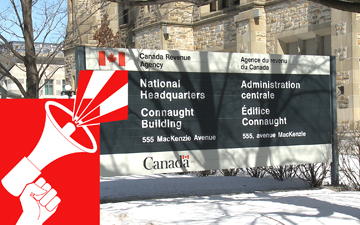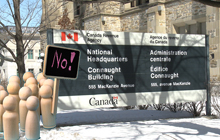Why the Canada Revenue Agency tax workers strike was good for Canadian accountants

All sides will benefit from the tentative settlement and four years of labour peace. But technology investment is mitigating the impact of CRA strikes
TORONTO, May 7, 2023 – Public sector tax workers returned to work this past week following a tentative settlement between the Union of Taxation Employees, a division of the Public Service Alliance of Canada (PSAC), and the Canada Revenue Agency. The deal followed months of acrimonious negotiations and a strike that coincided with the April 30 deadline to tax season.
While the timing of the strike inconvenienced taxpayers and tax preparers across the country, the details of the settlement benefit all parties involved, and may be most beneficial to Canadian accountants.
PSAC ended its 12-day strike on April 30 sending more than 120,000 public sector workers, who are paid by the Treasury Board, back to their jobs. But, in a surprise move, some 35,000 tax workers, who are paid by the CRA, remained on strike as the UTE continued negotiations on a separate collective agreement. The union blamed both the “Treasury Board’s interference and control” and the separate settlement by PSAC for prolonging strike action.
The separate deals are strikingly similar. Employees of both unions receive:
- a one-time pensionable payment of $2,500
- a compounded wage increase of 12.6 per cent over four years
- a promise to review the remote work policy through departmental panels
The benefits of the deal to the government and workers
Months of negotiations between the government and its unionized work force coalesced into two main issues: salaries and remote work. PSAC’s initial wage demand was a 13.5% increase over three years (4.5% per year) for all four groups comprising the 120,000 member workforce. But the combination of increased wage and non-wage benefits could have added up to 47 per cent in compensation over three years — an opening position in negotiations that earned the vitriol of public sector critics.
The final wage agreement was a compromise that addressed the significant issue of inflation and preserves four years of labour peace — a victory for both sides. The issue of remote work was also a thorn in negotiations, with the Treasury Board attempting to order PSAC workers back to in-person work, and removing telework as a bargaining chip in the process. This came at a time when many organizations, including CPA Canada, have accepted hybrid work environments.
The deal strikes an acceptable balance between the two sides. Workers will continue to work from home as reviews of telework continue. The government benefits from avoiding the inclusion of remote work wording in the collective bargaining agreement. While PSAC and the Treasury Board took a positive position following the deal, the reaction of the Union of Taxation Employees was pugnacious, vowing to lobby the government to take away bargaining control from the Treasury Board and give it to the CRA.
CRA deal a victory for Canadian accountants
After months of negotiations between all sides, PSAC timed its strike to occur during an advantageous negotiating period — the end of tax season — in a bid to maximize pressure on the government. The strategy initially appeared to work, as tax preparers complained of service interruptions, and a petition to extend the tax season deadline drew more than 30,000 signatures.
Groups such as the Canadian Federation of Independent Business called for back-to-work legislation, and some members of the public made incendiary comparisons between Freedom Convoy protestors and workers exercising their democratic rights.
The Liberal government, however, resisted demands to interfere in negotiations, and maintained the deadline. As predicted by Canadian Accountant, the impact of the strike was indeed stressful but limited, as accountants and bookkeepers anticipated and prepared for disruptions.
The expansion of online services in recent years also helped to mitigate the impact on tax preparers. The strike was largely limited to administrative and call centre employees rather than appeals and audit employees with higher taxation expertise who belong to the Professional Institute of the Public Service of Canada. Despite an extra few days on the picket lines, the Union of Taxation Employees agreed to the same offer accepted by PSAC, and (should the deal be ratified) Canadian accountants can now enjoy four years of labour peace.
For the government, the lesson is clear. Continued investment in technology can mitigate the impact of strike action. The progress made in modernizing the national tax filing system should be accelerated, as should plans to automate tax filings for low-income Canadians, which may lay the groundwork for further adoption. The work of individual tax workers at call centres is an important facet of CRA service but, four years from now, may be seen as less integral to the tax filing process.
Colin Ellis is a contributing editor to Canadian Accountant.










(0) Comments